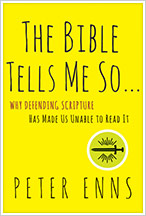The Bible Tells Me So
By Peter Enns
Review By Casey Fedde
Categories: Bible Study, Motivational, Old Testament / New Testament, Spiritual Living "The Bible Tells Me So" is Bible scholar Peter Enns's book about The Book. Incredibly astute, unfailingly honest, and downright funny, Enns takes an unfamiliar approach to Bible commentary. He is on a mission to remove Scripture from its lofty literary pedestal, loosen it from our elevated expectations, and reacquaint us with "the Bible we have, the Bible where God meets us" (232).
 As Bible groupies, we preach by it, live by it, swear by it. The Bible is the word of God: It's holy with a capital H. But are we really reading the Bible? Instead, we may be looking past God's mighty moments of plaguing and killing, ignoring the differing accounts of biblical narrators, and censoring our beloved Bible stories. Worst of all, we may be treating the Bible as our "heavenly instructional manual" instead of truly conversing with Scripture (3). Enns says that by switching on our spiritual and intellectual autopilot – full faith ahead! – we are shaping the very book that should be shaping us. "The problem isn't the Bible," he says. "The problem is coming to the Bible with expectations it's not set up to bear" (8). As Bible groupies, we preach by it, live by it, swear by it. The Bible is the word of God: It's holy with a capital H. But are we really reading the Bible? Instead, we may be looking past God's mighty moments of plaguing and killing, ignoring the differing accounts of biblical narrators, and censoring our beloved Bible stories. Worst of all, we may be treating the Bible as our "heavenly instructional manual" instead of truly conversing with Scripture (3). Enns says that by switching on our spiritual and intellectual autopilot – full faith ahead! – we are shaping the very book that should be shaping us. "The problem isn't the Bible," he says. "The problem is coming to the Bible with expectations it's not set up to bear" (8).
As Enns often says, let that sink in.
"In the Bible, we read of encounters with God by ancient peoples, in their times and places, asking their questions, and expressed in language and ideas familiar to them," Enns says (23). God is letting His children tell the story, not objectively but purposefully. And it's Enns's plan from page 1 to remind us of this.
"The Bible Tells Me So" marches readers through Israel's story in the Old Testament to illustrate how biblical writers wrote about the past. Enns queues up the stories of Jesus – yes, that's stories plural – from the four Gospels as proof of writers who "present the same past events from different perspectives" (76). Then he introduces Paul, Mr. New Testament, who had to transition his writings from the Old Testament's surprise ending: "a crucified and risen messiah wasn't something Israel's story was set up to handle," Enns says (214). Fortunately, Paul was up to the challenge. Through Paul's writings, we witness the transformation of a tribal story "into a global story of God's grace" (218).
Enns's message is clear: This Bible – "with wrinkles, complexities, unexpected maneuvers, and downright strangeness" – is worth reading and paying attention to (232). The stories in the Bible are not our script to follow but are scriptures by ancient people from which we gain wisdom. So "the Bible, just as it is, still works," he notes (236).
While Enns's tenacity in delivering his message may be misconstrued as a rebuke on the faithful, his enthusiasm for deeper thinking while studying Scripture is heartfelt. To my personal delight, Enns validates many tense conversations around little wooden tables in Sunday schools everywhere: "God has invited us to participate in a wrestling match, a forum for us to be stretched and to grow" (22). It's OK to converse with, complain to, and talk back to the Bible, he says, "not as an act of rebellion, but as an act of faith and trust." After all, "trusting God is not the same thing as trusting the Bible" (21).
"The Bible Tells Me So" reintroduces readers to a lifelong companion and truly makes Scripture once again seem approachable, present, and immensely readable.
"The Bible Tells Me So" by Peter Enns, HarperOne, 267 pp. |